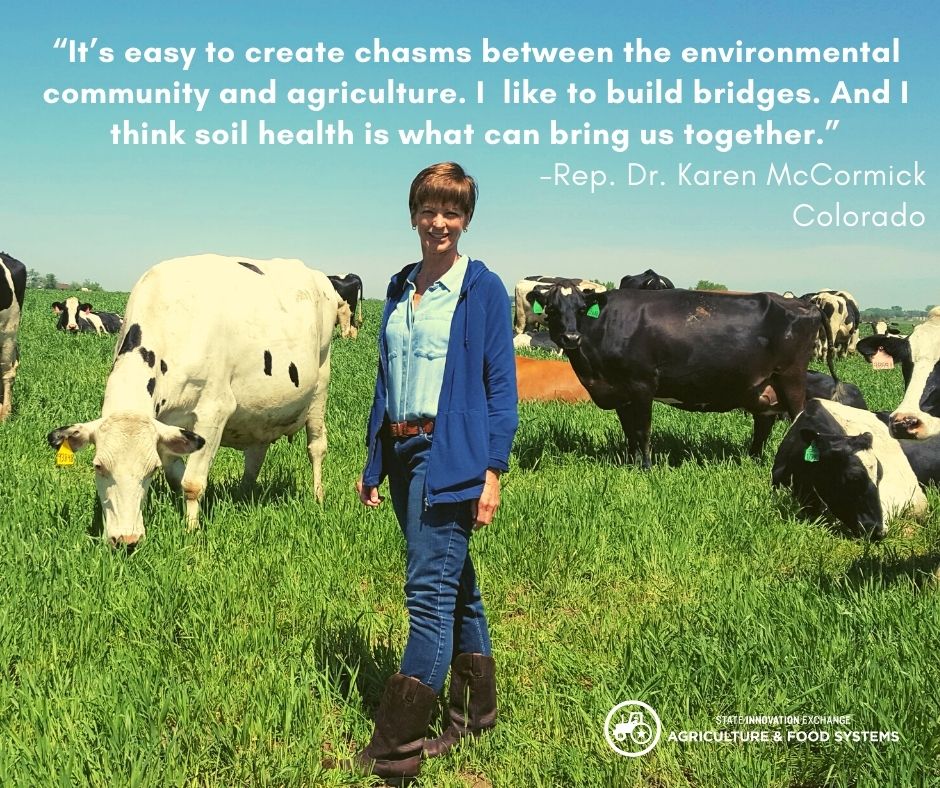Growing up, Representative Dr. Karen McCormick knew she wanted to study veterinary medicine. Being raised in an urban area she jumped at any opportunity to work with animals and sought out a job at a stable in exchange for riding lessons. In college, McCormick studied animal science and later dairy science before going on to an almost-35 year career as a doctor of veterinary medicine.
Today she is the only veterinarian serving in the Colorado legislature.
It was the Colorado Collaborative for Healthy Soils who introduced McCormick to the need for soil health policy in the state. Some of the organizations that belong to the collaborative are Holistic Management International, Western Landowners Alliance, Rocky Mountain Farmers Union, and TomKat Ranch Educational Foundation. There are also a number of Colorado-based ranches who participate in the group and have been a part of the conversation.
Through a multi-stakeholder process that took over a year and half, the collaborative traveled the state speaking with farmers and ranchers to collect information, identify needs and determine where resources were lacking. It was this process that ultimately resulted in Rep. McCormick’s understanding of the need for policy to support Colorado producers to improve soil practices.

“When I heard of the extent of the process that went into the recommendations for legislation, all of the stakeholders that were involved and that it was written for agriculture by those practicing good soil health – I knew I wanted to be a part of the solution.”
The result was CO HB 21-1181, a bill with bipartisan support that seeks to create the Colorado Soil Health Program within the Colorado Department of Agriculture. The program is completely voluntary and will be set up to receive philanthropic money to jump start the program before it would be completely funded by the state budget.
The Colorado Soil Health Program will be set up to serve farmers and ranchers who are seeking assistance on soil health and will provide educational resources and technical assistance. There will also be a research component that will create a soil health inventory in the state so that Colorado State University in partnership with the Collaborative can have the data necessary to make good decisions about Colorado soil health. The bill also creates a soil health advisory committee that is representative of the agriculture, state and federal agencies, soil and water conservation districts and tribal nations in the state that will review projects and administer grants to producers.
“There are so many farmers who have been managing for soil health and are doing really well across our state. This program is for the producers that would like to do a better job or implement practices that they might not currently have the resources to do,” says McCormick.
Rep. McCormick loves the idea of using soil to sequester carbon but she sees good soil health as a way to conserve and preserve water as well. She also thinks that when producers manage for soil health, they will see a decrease in resources required thus saving money.
“When we maximize soil health, production goes up and farmers are going to be minimizing pesticides and synthetic fertilizers, saving producers money,” said McCormick. “Everything points to healthy soil leading to better production, which means more profits for producers as well.”
In addition to this bill, McCormick mentioned that they are also looking into ways that they can tap into the federal stimulus money to support farmers to be more soil-centric with their practices.
“There are just so many opportunities right now and this is the right time. I am so happy to see agriculture being positioned as a climate solution and producers having the opportunity to benefit as well.”
McCormick mentioned that sometimes there is a dance that a policymaker must do when working on environmental issues with producers who are managing lands and have been for generations. “It’s easy to create chasms between the environmental community and agriculture.” explains McCormick. “I like to build bridges. And I think soil health is what can bring us together.”
________
The Bill: CO HB 21-1181
Sponsors: Karen McCormick Perry Will Cleave Simpson Faith Winter
Where it’s at: Passed the House, introduced in the Senate
Where it’s expected to go: Expected to move through the Senate later this Session
About the Legislator: Representative Karen McCormick, District 11 serving in her first term
Earth Day traditions: “My very first Earth Day I went out to a March in 1972 in Northern Virginia. It was a big deal – they shut down a four-lane highway. We met at a community college, had our hand-made posters and we just walked. We walked down the streets with our signs. I wore my Earth Day medallion and it was super cool. So every year when Earth Day comes around I have that memory because being in a march like that left a big impression on me.”
Advice to other legislators: “ You don’t need to be an expert in agriculture. It’s not about you, it’s about the folks that are doing the work. You just need to find the coalitions that are working and having conversations about these issues. They are out there! You can find groups like the Farmers Union, and the Young Farmers Coalition in your state. Brainstorm who is working in that space and reach out to them. They know what they need and as a legislator you might just be the person to be able to carry the legislation to help them out.”

